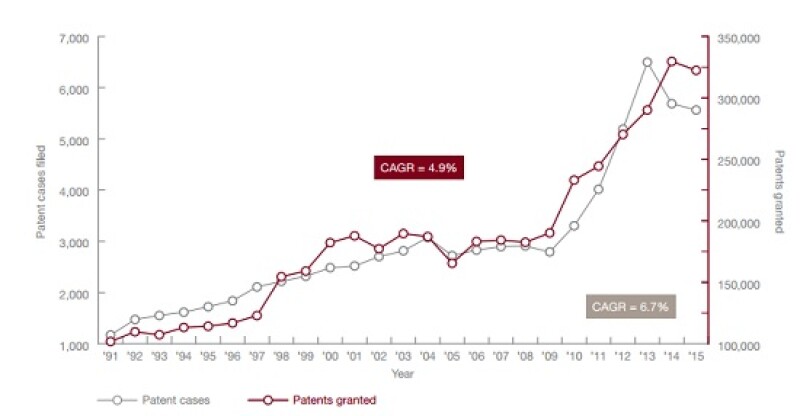The 2016 version of PwC’s widely-read Patent Litigation Study is out, this year’s subtitled “Are we at an inflection point”.
While the report contains a lot of interesting information about patent litigation in the US, one of the most interesting facts is not directly to do with litigation. Rather, the report reveals 2015 showed a decrease in patents granted by the USPTO, the first decline since 2008.
The number of patent cases filed also fell in 2015. The roughly 5,600 cases filed was down 2% from 2014, which itself was a fall from the high point in 2015.
“The decline in the number of patent cases filed and patents granted is likely driven by various factors – one being the Supreme Court’s 2014 decision in Alice Corp v CLS Bank, which significantly impacted the ability to obtain and assert software patents,” noted PwC in the report.

Other trends noted in the report include:
· The 2015 median annual damages award ($10.2 million) reached the highest point in 10 years, with one mega verdict in 2015 of $533 million.
· Consumer products still leads in number of cases, while the biotech/pharma industries have the highest median damages awards.
· Damages awards for non-practicing entities are almost three times greater than for practicing entities over the past five years.
· NPE cases are concentrated. Five district courts (of 94) account for 45% of all identified NPE decisions.
· The patentee success rate stands at 33%.
· Time to trial edged up to 2.5 years in 2015.
· Some 80% of district court decisions are appealed, and 53% of appealed decisions are modified in some regard.
· There is an increased likelihood of fee shifting following two 2014 Supreme Court decisions. “Fee shifting in patent cases caught attention this year, with discussion focused on the merits and disadvantages of ‘fee shifting’ – making the loser pay the legal costs of litigation,” said PwC.










